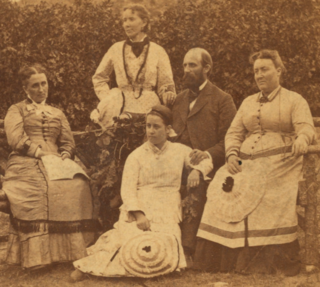Related Research Articles

Marriage, also called matrimony or wedlock, is a culturally and often legally recognised union between people called spouses. It establishes rights and obligations between them, as well as between them and their children, and between them and their in-laws. It is nearly a cultural universal, but the definition of marriage varies between cultures and religions, and over time. Typically, it is an institution in which interpersonal relationships, usually sexual, are acknowledged or sanctioned. In some cultures, marriage is recommended or considered to be compulsory before pursuing sexual activity. A marriage ceremony is called a wedding, while a private marriage is sometimes called an elopement.

Polygyny is a form of polygamy entailing the marriage of a man to several women. The term polygyny is from Neoclassical Greek πολυγυνία (polugunía); from Ancient Greek πολύ (polú) 'many' and γυνή (gunḗ) 'woman, wife'.
Polygamy is the practice of marrying multiple spouses. When a man is married to more than one wife at the same time, it is called polygyny. When a woman is married to more than one husband at the same time, it is called polyandry. In sociobiology and zoology, researchers use polygamy in a broad sense to mean any form of multiple mating.

Polygamy was practiced by leaders of the Church of Jesus Christ of Latter-day Saints for more than half of the 19th century, and practiced publicly from 1852 to 1890 by between 20 and 30 percent of Latter-day Saint families.

A wife is a woman in a marital relationship. A woman who has separated from her partner continues to be a wife until their marriage is legally dissolved with a divorce judgment. On the death of her partner, a wife is referred to as a widow. The rights and obligations of a wife to her partner and her status in the community and law vary between cultures and have varied over time.
Conflict of marriage laws is the conflict of laws with respect to marriage in different jurisdictions. When marriage-related issues arise between couples with diverse backgrounds, questions as to which legal systems and norms should be applied to the relationship naturally follow with various potentially applicable systems frequently conflicting with one another.

A husband is a man involved in a marital relationship, commonly referred to as a spouse. The specific rights, responsibilities, and societal status attributed to a husband can vary significantly across different cultures and historical periods, reflecting a global perspective on this role.
The type, functions, and characteristics of marriage vary from culture to culture, and can change over time. In general there are two types: civil marriage and religious marriage, and typically marriages employ a combination of both. Marriages between people of differing religions are called interfaith marriages, while marital conversion, a more controversial concept than interfaith marriage, refers to the religious conversion of one partner to the other's religion for sake of satisfying a religious requirement.
Polygamy is "the practice or custom of having more than one wife or husband at the same time." Polygamy has been practiced by many cultures throughout history.

Joseph Smith, the founder of the Latter Day Saint movement, privately taught and practiced polygamy. After Smith's death in 1844, the church he established splintered into several competing groups. Disagreement over Smith's doctrine of "plural marriage" has been among the primary reasons for multiple church schisms.
Polygamy in Pakistan is legally permissible, according to the law of 1961, but restricted to Muslim men, who may have a maximum of four wives at one time. However it is illegal for Hindus as per the Hindu marriage law.

Under civil law, Nigeria does not recognize polygamous unions. However, 12 out of the 36 Nigerian states recognize polygamous marriages as being equivalent to monogamous marriages. All twelve states are governed by Sharia law. The states, which are all northern, include the states of Bauchi, Borno, Gombe, Jigawa, Kaduna, Kano, Katsina, Kebbi, Niger, Sokoto, Yobe, and Zamfara which allows for a man to take more than one wife.
The Republic of Afghanistan, which is an Islamic Republic under Sharia Law, allows for polygyny. Afghan men may take up to four wives, as Islam allows for such. A man must treat all of his wives equally; however, it has been reported that these regulations are rarely followed. While the Qur'an states that a man is allowed a maximum of four wives, there is an unspecified number of women allowed to be his 'concubines'. These women are considered unprotected and need a man as a guardian.
Though legally prohibited since 1962, polygamy is still marginally practiced in Rwanda. Polygyny is the only form traditionally practiced. It is most prevalent in rural areas, older generations, and adherents of traditional/animist religion. In 2012, 5.4% of rural men were in polygynous unions; this included 15% of rural men over 80 years old but less than 3% of men under 30, with the average number of wives being two. Animism has the greatest proportion of polygynous men, followed by non-religious men and Islam. However, the vast majority of polygynous men are Christian. Polygyny has been in decline since the first census data in 1978.

The legal status of polygamy varies widely around the world. Polygamy is legal in 58 out of nearly 200 sovereign states, the vast majority of them being Muslim-majority countries. Some countries that permit polygamy have restrictions, such as requiring the first wife to give her consent.
Polygamy is not legally recognised in Australia. Legally recognised polygamous marriages may not be performed in Australia, and a person who marries another person, knowing that the previous marriage is still subsisting, commits an offence of bigamy under section 94 of the Marriage Act 1961, which carries a maximum penalty of 5 years imprisonment. However, the offence of bigamy only applies to attempts to contract a legally recognised marriage; it does not apply to polygamous marriages where there is no attempt to gain recognition for the marriage under Australian law. Whether or not either or both partners were aware of the previous subsisting marriage, the second marriage is void. Foreign polygamous marriages are not recognized in Australia. However, a foreign marriage that is not polygamous but could potentially become polygamous at a later date under the law of the country where the marriage took place is recognized in Australia while any subsequent polygamous marriage is not. While under Australian law a person can be in at most one legally valid marriage at a time, Australian law does recognise that a person can be in multiple de facto relationships concurrently, and as such entitled to the legal rights extended to members of de facto relationships.
Polygamy is the practice of having more than one spouse; while prohibited under Zimbabwean civil law, polygamous marriages may be performed under the country's customary law. Less than one-fifth of the country's population are engaged in polygamy.

In the Sasanian Empire, the state religion Zoroastrianism created the policy that dictated relationships between men and women. Zoroastrianism set what roles women would have, the marriage practices, women's privileges in Sasanian society and influenced Islam when it arose. The moral standards, the structure of life, and the practices of the Sasanian society were found by looking at the religious writing and laws of the time. Women had legal rights, such as to own real estate, but the privileges a woman had depended on what type of wife she was, as did the restriction that were placed on her.
Great Wife, otherwise appearing in West Africa as Senior Wife, is an honorific applied to the principal female spouse in African polygynous unions. It is widely used by contemporary royal and aristocratic wives in states throughout the modern continent as a synonym for consort.
Polygamy in Africa has existed throughout the history of Africa. Polygamy, particularly polygyny, is a highly valued social institution in Africa. Polygamy is a marriage between a man or woman and their multiple spouses. Polygyny is a marriage between a man and multiple wives. Polyandry is a marriage between a woman and multiple husbands. A common expectation for African kings in African societies is for African kings to symbolically unify his kingdom and the society through partaking in polygamous marriages with wives from a broad range of clans within the society. By doing so, the king reduces the chance of dissident and rival forces developing and rising against him.
References
- ↑ Jamnarnwej, Wimolsiri. "Family Law of Thailand; B. Marriage". Thailand Law Forum. Retrieved 22 August 2018.
- 1 2 Law of Husband and Wives B.E. 1904
- ↑ Chintana Yossoonthorn, "Women in Thailand", Proceedings of the Peace Corps Conference on Women and Development, Bangkok, 1979, p. 11.
- ↑ "Thai king strips consort of titles for 'disloyalty'". BBC News. October 21, 2019.
- ↑ Civil and Commercial Code, Article 1452[ full citation needed ]